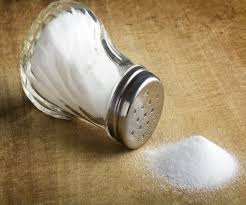- Home
- Editorial
- News
- Practice Guidelines
- Anesthesiology Guidelines
- Cancer Guidelines
- Cardiac Sciences Guidelines
- Critical Care Guidelines
- Dentistry Guidelines
- Dermatology Guidelines
- Diabetes and Endo Guidelines
- Diagnostics Guidelines
- ENT Guidelines
- Featured Practice Guidelines
- Gastroenterology Guidelines
- Geriatrics Guidelines
- Medicine Guidelines
- Nephrology Guidelines
- Neurosciences Guidelines
- Obs and Gynae Guidelines
- Ophthalmology Guidelines
- Orthopaedics Guidelines
- Paediatrics Guidelines
- Psychiatry Guidelines
- Pulmonology Guidelines
- Radiology Guidelines
- Surgery Guidelines
- Urology Guidelines
Have high BP- Can you reduce salt while keeping the salty taste?

The patients of high Blood pressure who use low salt substitutes containing Potassium chloride usually stop using them due to the taste factor. How to reduce salt intake while keeping the taste in high blood pressure is a key question which researchers need to work on.
Salt restriction is an important modifiable factor of lifestyle to treat and prevent high blood pressure and reduction of dietary salt intake is generally an effective measure to reduce blood pressure. Knowing fully well that excess salt intake is one of the most important causes of hypertension and salt restriction is a difficult proposition.
The 2015–2020 Dietary Guidelines for Americans recommend that Americans consume less than 2,300 milligrams (mg) of sodium per day as part of a healthy eating pattern. Based on these guidelines, the vast majority of adults eat more sodium than they should—an average of more than 3,400 mg each day.
The researchers at Washington State University have found a way to make food taste salty but with less of the sodium chloride tied to poor health. In a paper published in the Journal of Food Science, Ross and colleagues looked at salt blends that use less sodium chloride and include other salts like calcium chloride and potassium chloride.
"It's a stealth approach, not like buying the 'reduced salt' option, which people generally don't like," said Carolyn Ross, a Food Science professor at WSU. "If we can stair-step people down, then we increase health while still making food that people want to eat."
Both of those salts have no adverse health effects on people, Ross said. Potassium can actually help reduce blood pressure. Unfortunately, they aren't very tasty.
"Potassium chloride, especially, tastes really bitter and people really don't like it," Ross said.
The researchers used tasting panels and WSU's electronic tongue to see just how much they could add the replacement salts for standard sodium chloride before people found the food unacceptable to eat.
Some tasting panels tested a variety of salt solutions, or salt in water, while others tested different salt combinations in tomato soup.
Using the e-tongue and panels, they found that a blend using approximately 96.4 percent sodium chloride with 1.6 percent potassium chloride and 2 per cent calcium chloride was the ideal reduction.
They had a higher reduction when they added only calcium chloride, getting acceptable rates with a combination of 78 percent sodium chloride and 22 percent calcium chloride.
"This combination of the two salts did not significantly differ compared to 100 percent sodium chloride," Ross said. "But when we added potassium chloride, consumer acceptance decreased."
While humans need salt, Americans consume significantly more than is necessary or even healthy. According to the U.S. Office of Disease Prevention and Health Promotion, the recommended maximum amount of salt consumed per day is less than 2,300 mg. The average American adult female consumes 2,980 mg per day, while males average over 4,000 mg per day.
Recent findings have suggested that gradual reductions in salt over a period of years is the best way to reduce salt consumption. Using one of the new blends for a specified time frame could lead to greater reductions down the road.
For more details click on the link: http://dx.

Disclaimer: This site is primarily intended for healthcare professionals. Any content/information on this website does not replace the advice of medical and/or health professionals and should not be construed as medical/diagnostic advice/endorsement or prescription. Use of this site is subject to our terms of use, privacy policy, advertisement policy. © 2020 Minerva Medical Treatment Pvt Ltd